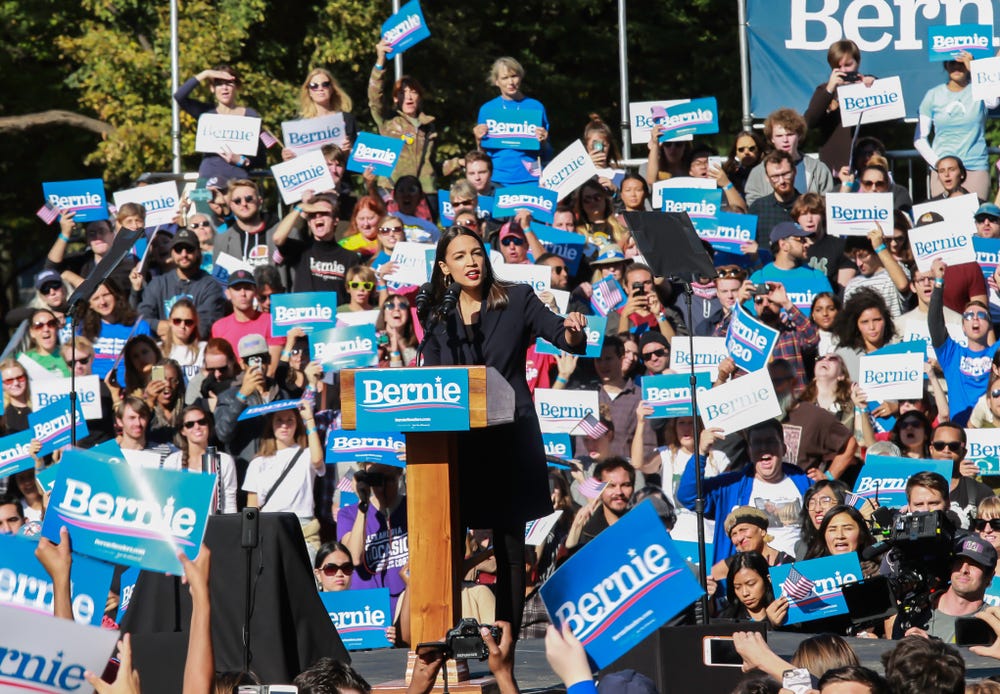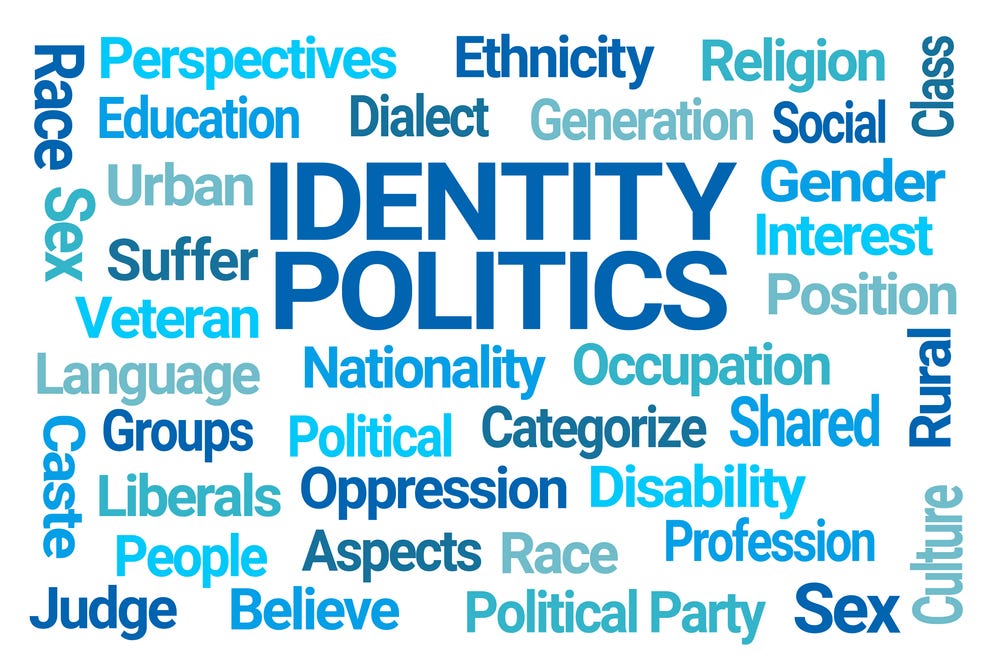E-Pluribus | May 13, 2022
When inclusion means conformity, how the Democratic Party's leftward shift is going, and identity politics under the microscope.
A round-up of the latest and best writing and musings on the rise of illiberalism in the public discourse:
Frances Widdowson: Exclusionary Inclusivity: How the Mount Royal Faculty Association’s ‘Woke’ Faction Coerces Conformity
The United States is not alone in its struggles with diversity, equity and inclusion. Frances Widdowson at Minding the Campus relates her experiences with Mount Royal University in Calgary, Alberta, Canada. Although the Mount Royal Faculty Association union is representing Widdowson in her wrongful dismissal suit against the school, Widdowson documents how the union itself is part of the problem.
[T]he four examples, to which the MRFA member referred last year, were not “hateful and discriminatory.” All of them criticized certain ideas and were not even directed at particular groups. In my own case, for example, some considered criticisms of the concepts of “misgendering fatigue” and “indigenous science” to be “hateful,” “harassing,” and “discriminatory,” and I was subjected to three investigations on this basis. The acceptance that my legitimate criticisms somehow created a “toxic workplace” appeared to justify excluding me from the “inclusive” 2022 Spring Retreat.
This, it should be understood, is part of a reactionary agenda that has been called “reified postmodernism” by Helen Pluckrose and James Lindsay—a de-Enlightenment project known colloquially as “woke-ism.” “Woke-ism” is a form of identity politics that has become totalitarian. It puts all MRFA members on an intersectional “positionality” scale of oppression and maintains that those who are perceived to be the most oppressed have the most right to speak. Those who are assumed to be oppressors, on the other hand, should be silenced if their views are believed to cause harm. This is because “woke-ism” considers oppressors to be “punching down” on the marginalized and preventing them from overcoming their disadvantage.
These arguments, which are aggressively asserting themselves at MRU and within the MRFA, were responsible for imposing a code of conduct upon all members. Although the MRFA pretends to be concerned about “inclusion,” it actually acts to exclude those views that challenge “woke-ism.” This “woke” agenda is destroying the academic character of Mount Royal University because it acts to “exclude” controversial viewpoints. In order to pursue the truth, professors need to consider arguments with which they disagree and follow the evidence wherever it leads. “Woke-ism,” on the other hand, has a predetermined answer and acts to punish anyone who challenges its dogmatic assumptions. It creates “exclusionary inclusivity”—language that would be right at home in George Orwell’s dystopic novel 1984.
Read the whole thing.
Ruy Teixeira: The Bankruptcy of the Democratic Party Left
Progressives in the Democratic Party often capture the imagination of the media and are presented as the wave of the future. However, Ruy Teixeira at his The Liberal Patriot Substack makes a powerful case that the leftward move of the Democratic Party has been an unmitigated disaster in the Biden era.
The thread that runs through all these failures is the Democratic Left’s adamant refusal to base its political approach on the actually-existing opinions and values of actually-existing American voters. Instead they entertain fantasies about kindling a prairie fire of progressive turnout with their approach, despite falling short again and again in the real world. It hasn’t worked and it won’t work.
Instead, what they need is a plan on how to win outside of deep blue areas and states (the average Congressional Progressive Caucus leader is from a Democratic +19 district). That entails compromises that, so far, the Democratic Left has not been willing to make. Cultural moderation, effective governance and smart campaigning are what is needed to win in competitive areas of the country. If democracy is in as much danger as the Democratic Left appears to believe, would not such compromises be worth making? And wouldn’t winning make a nice change of pace at this point?
Read it all.
Zak Cheney-Rice: What’s Wrong With Identity Politics?
Identity politics has been a hallmark of left-of-center politics for decades now, but now its effectiveness is being questioned at New York Magazine, of all places. Zak Cheney-Rice writes about philosopher Olúfemi O. Táíwò’s latest book, Elite Capture, which faults elites for hijacking disadvantaged groups for their own benefit. As the kicker in Cheney-Rice’s article notes in a quote from Táíwò’s book, whatever issues of oppression, diversity, equity, inclusion, or power dynamics existed in Flint, Michigan, practically speaking, “What Flint residents really needed, above all, was to get the lead out of their water.”
On May 3, Táíwò published his second book, Elite Capture, which deals with the confused ways the concept of identity is used in American political culture. The idea of elite capture has been around for decades and typically describes how the most advantaged people in a group take control of benefits that are meant for everybody — as, for example, how a leader in a developing country might use foreign-aid money to line his own pockets. Táíwò’s innovation is applying this idea to identity politics, the concept devised in 1977 by the Black radical feminists of the Combahee River Collective. He argues that their project has been hijacked. “We believe that the most profound and potentially most radical politics come directly out of our own identity,” they wrote, because organizing around what was good for people at the bottom of social hierarchies would be good for all oppressed people. But rather than using personal identity as an entry point to building radical coalitions, as these innovators intended, elites are using it as a tool to advance their own narrow interests.
[ . . . ]
In Elite Capture, Táíwò refers only obliquely to his personal experiences with violence. (The story about Abeokuta does not make an appearance.) But his upbringing is deeply entwined with the fact that genocide, in the form of the 1966 anti-Igbo pogrom that led to the Nigeria-Biafra War between 1967 and 1970, was a living memory for many people he grew up around. Their identity-based experiences and suffering, what you might call their Nigerian-ness, did not automatically make them wise or good or heroic — to say nothing of establishing them as natural authorities on what a just world should look like. “There were people with anger and other emotional-regulation issues,” he told me. “There were incidents of abuse, especially of kids.”
As a result, faddish calls to “listen to the most affected” or “center the most marginalized,” which abound in the academic and leftist activist circles he occupies and bleed out into the corporate world and the halls of Congress, “never sat well with me,” Táíwò writes. When people said these things to him, “it wasn’t usually because they intended to set up Skype calls to refugee camps or to collaborate with houseless people.” Instead, inside the elite spaces on campus or within government, deference to people who seemed marginalized was mostly a well-intended but hollow gesture.
Read it all here.
Around Twitter
A thread from Tim Urban with some warnings for those involved in public discourse:
John McWhorter on “anti-racism” and how it recalls a Soviet Union ideology:
And finally, the latest from the new head of the Biden administration’s Disinformation Governance Board:








